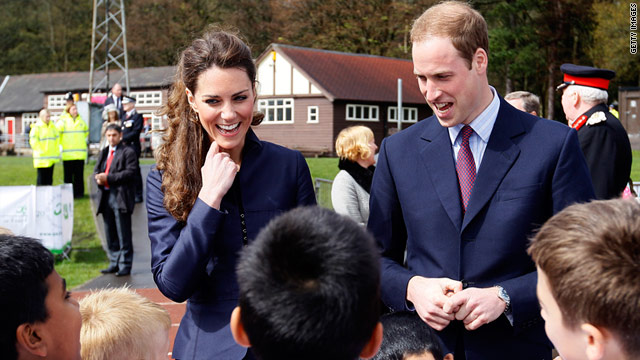 The happily-ever-after business would not necessarily seem to be a growth industry these days.
The happily-ever-after business would not necessarily seem to be a growth industry these days.This week's royal wedding in London is expected to be witnessed by a large audience around the world. The appeal of royal weddings -- hope, romance, stirring pageantry -- depends on people choosing to put their own troubles aside for a few hours, and basking in the reflected glow of two strangers' happiness.
Certainly, at least in the United States, there is every indication that some cheering up is needed. In the last week alone, three pieces of news have underscored just how lousy a lot of people are feeling, or have a right to be feeling.
A New York Times/CBS News poll found that "Americans are more pessimistic about the nation's economic outlook and overall direction" than they have been in two years. The Times summarized the findings: "Amid rising gas prices, stubborn unemployment and a cacophonous debate in Washington over the federal government's ability to meet its future obligations, the poll presents stark evidence that the slow, if unsteady, gains in public confidence earlier this year that a recovery was under way are now all but gone."
Then there was this data, released by the AFL-CIO: Chief executives at 299 of the country's largest corporations make 343 times more in total annual pay than the average American worker does. Bosses, of course, are expected to make more than their employees. But in an economy where so many families are struggling, the report on the average pay of the CEOs -- $11.4 million -- juxtaposed with the average pay of the men and women who work for them -- $33,190 -- might feel to some like salt in an open wound.
But at least those employees have jobs. An Associated Press-Viacom poll found that young people with a high school education or less are having an extraordinarily difficult time trying to start their working lives. According to the poll, only a third of those young men and women are working full time. (This was compared with two-thirds of recent college graduates who are working full time, the Associated Press reported. Which sounds more hopeful for the new college graduates, until you stop to consider how the third of them with diplomas who haven't found full-time work are feeling.)
At least in the United States, there is every indication that some cheering up is needed.
--Bob Greene
--Bob Greene



And so, against that backdrop, the royal wedding arrives, and the happily-ever-after message such festivities have traditionally been counted on to sell.
That's really the basis of such ceremonies' allure: to make people who will never meet the royal couple willingly identify with the exhilarating sense of optimism and a potentially joyous future that are intrinsic to these occasions.
It's not all that symbolically different from, say, fans of local professional sports teams exulting in the victories of multimillionaire athletes who are in town part of the year solely because they are paid to wear the teams' jerseys. Are the lives of the teams' supporters truly improved each time the team manages to win a game? They are if the victories help the fans, if only briefly, manage to push aside whatever gray clouds may be hovering over their own daily lives, and let the triumphs of players they don't know be their own triumphs.
This can become more of a challenge when matters in the actual world are particularly dismal. Yet I heard from a colleague the other day who recalled what he was doing 30 years ago, when Prince Charles married Diana Spencer in a ceremony that, like the one in which Charles' and Diana's son William will marry Kate Middleton this week, was telecast around the globe.
My colleague said that he had just completed his first year in college. In that summer of 1981, a deep recession was forming; he was a baseball fan, and -- he could scarcely believe this -- big-league baseball had gone on strike. The one summer job he was able -- gratefully -- to find was as an overnight janitor at a discount department store near an interstate highway exit in Indiana.
He told me that before dawn on July 29, he and the four other overnight janitors in the empty store "stopped our floor-waxing and toilet-scrubbing and headed over to housewares, where we pulled up a few Day-Glo-colored beanbag chairs" and watched as, in faraway London, Charles and Diana exchanged their vows.
"It must have looked pretty funny," he said, "our raggedy gang of T-shirted janitors with torn jeans watching this highfalutin spectacle occurring an ocean away with such interest."
Someone else's happiness was not a bad thing to be watching on a screen that day...
--Bob Greene
--Bob Greene
RELATED TOPICS
He does not recall feeling resentful watching the wealthy, celebrated couple, nor does he recall that he and his buddies on the janitorial overnight shift had unpleasant things to say about the wedding, or about the bride and groom. It was a welcome, brightening diversion; someone else's happiness was not a bad thing to be watching on a screen that day or that summer, and the fact that Charles and Diana did not manage to live happily ever after does not, he said, erase or darken the memory.
In the end, this week's royal wedding may be not much more than a pretty television show, but sometimes that's enough. As soon as it concludes, a new workday will begin in the United States, at least for those who are fortunate enough to have jobs. Happily Ever After, Inc., in all its many forms, will always be with us, and it probably should not be surprising that, even and especially in the most difficult of times, there will never be a shortage of eager customers.
The opinions expressed in this commentary are solely those of Bob Greene.
No comments:
Post a Comment